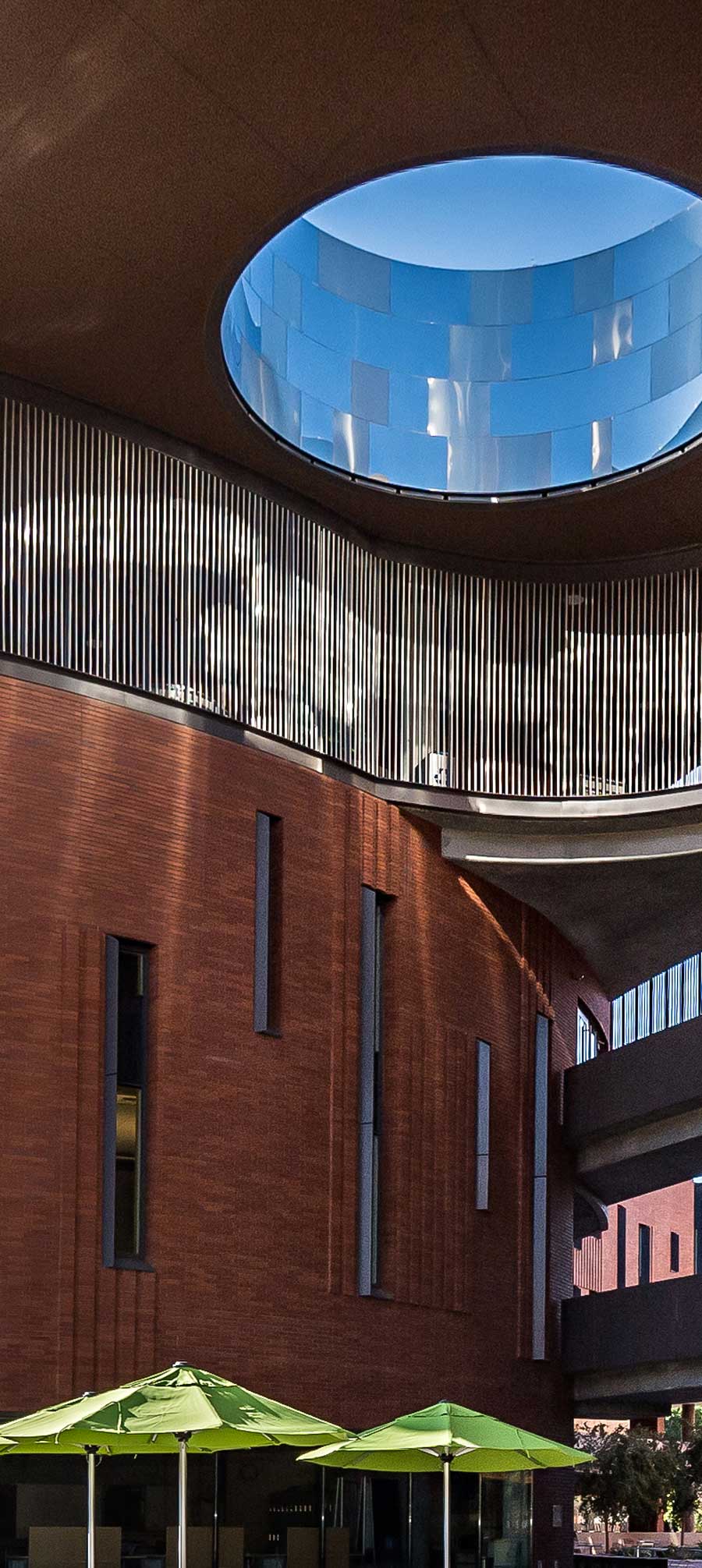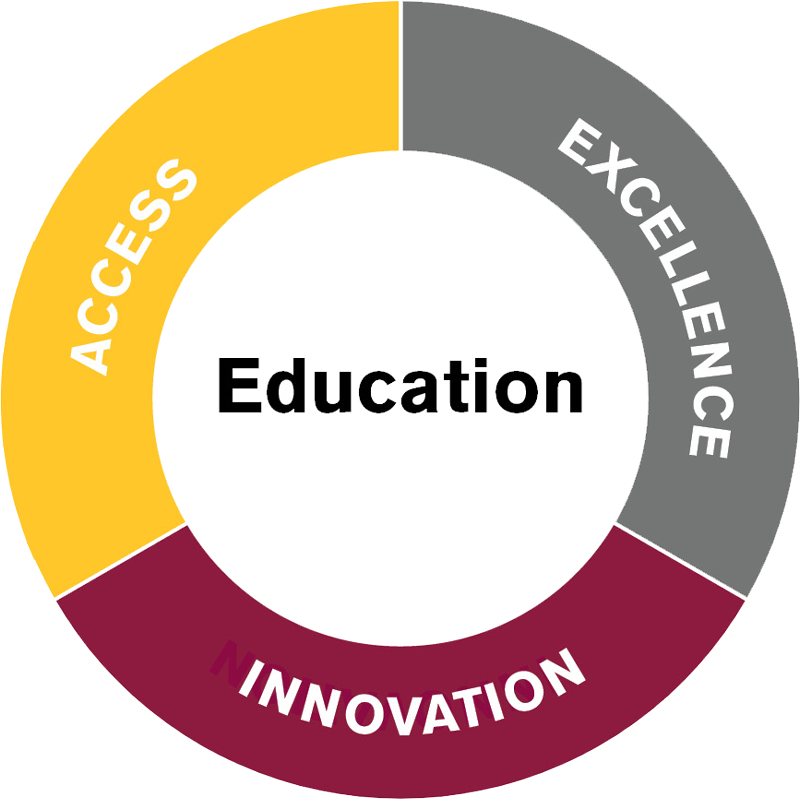
Propelling business forward
t W. P. Carey, we’ve embarked on an ambitious strategic planning process that will build on the business school’s existing foundation and shape its future.
The results we want?
To strengthen W. P. Carey’s global leadership position in business research, education, and engagement within five years.
Led by Dean Ohad Kadan, the schoolwide process examines critical areas of growth and opportunity with guidance from school leadership and key constituencies, including alumni, faculty, staff, students, donors, and corporate and community partners.
As part of the process, leaders in W. P. Carey’s business units are addressing needs and developing priorities that align with the school’s vision and mission. This work will help define a standard of success for the school’s objectives and provide a blueprint for the resources and collaboration needed to achieve the goals.
Discover more about W. P. Carey’s 10 core tenets, what these beliefs and convictions look like in practice, and how they will illustrate the school’s future obligations and aspirations.
1.
Providing access to business education is foundational
For instance, the middle school outreach program Secret Code of Business triggers an early passion for pursuing a STEM-related college degree and career. Fleisher Scholars is a high school summer program that provides sophomores and juniors from Arizona high schools an opportunity to earn college credit, receive a laptop, dive into entrepreneurship, and discover potential career paths.

Propelling business forward
t W. P. Carey, we’ve embarked on an ambitious strategic planning process that will build on the business school’s existing foundation and shape its future.
The results we want?
To strengthen W. P. Carey’s global leadership position in business research, education, and engagement within five years.
Led by Dean Ohad Kadan, the schoolwide process examines critical areas of growth and opportunity with guidance from school leadership and key constituencies, including alumni, faculty, staff, students, donors, and corporate and community partners.
As part of the process, leaders in W. P. Carey’s business units are addressing needs and developing priorities that align with the school’s vision and mission. This work will help define a standard of success for the school’s objectives and provide a blueprint for the resources and collaboration needed to achieve the goals.
Discover more about W. P. Carey’s 10 core tenets, what these beliefs and convictions look like in practice, and how they will illustrate the school’s future obligations and aspirations.
1.
Providing access to business education is foundational
For instance, the middle school outreach program Secret Code of Business triggers an early passion for pursuing a STEM-related college degree and career. Fleisher Scholars is a high school summer program that provides sophomores and juniors from Arizona high schools an opportunity to earn college credit, receive a laptop, dive into entrepreneurship, and discover potential career paths.
One of the primary benefits of the third-semester option is that students can add an extra component to their studies without enrolling in another program, reducing the red tape. The third-semester concentration also incorporates an internship element. In addition, the third-semester concentration feature is an excellent entry point for international students who want to experience cultural immersion and gain career development with a multinational company while studying in the United States.

- Bite-sized learning: W. P. Carey’s microcredentials and stackable programs are smaller bites of learning that students take as stand-alone classes in person or online and leverage as a pathway to a degree, job opportunity, and upskilling or reskilling. These bite-sized programs also allow students to gain knowledge for no academic credit or credit when applied to certificate, undergraduate, or graduate programs.
- Coming soon: W. P. Carey is working on expanding offerings at the ASU Polytechnic and West campuses and the ASU California Center in Los Angeles, consistent with the strategic plan and ASU’s goals.
- Good to know: ASU’s Charter demands we measure ourselves “not by whom we exclude, but by whom we include and how they succeed.” In the 2021–22 school year, 30.3% of undergraduate students came from underrepresented backgrounds.
- Bite-sized learning: W. P. Carey’s microcredentials and stackable programs are smaller bites of learning that students take as stand-alone classes in person or online and leverage as a pathway to a degree, job opportunity, and upskilling or reskilling. These bite-sized programs also allow students to gain knowledge for no academic credit or credit when applied to certificate, undergraduate, or graduate programs.
- Coming soon: W. P. Carey is working on expanding offerings at the ASU Polytechnic and West campuses and the ASU California Center in Los Angeles, consistent with the strategic plan and ASU’s goals.
- Good to know: ASU’s Charter demands we measure ourselves “not by whom we exclude, but by whom we include and how they succeed.” In the 2021–22 school year, 30.3% of undergraduate students came from underrepresented backgrounds.
2.
We embrace modern technology in our curriculum and operations
“As great as simulations are, students don’t feel like they’re in it. They’re always on the outside,” says Thomas Kull, chair and professor of supply chain management and creator of the Coffee Trade simulation. “With internships, students have to leave the academic environment; it’s not seamless.”
So, at W. P. Carey, faculty are demoing virtual reality (VR). VR technology will be another tool to enhance learning with changing expectations of the business classroom experience. It won’t replace existing tools and approaches; instead, VR will add a fresh dimension to the virtual and physical classroom. VR’s ability to assign different roles and attributes to participants within the experience will help students learn from diverse situations.
The VR scenario for supply chain students, for example, could be to negotiate an acquisition of microchips for a multimillion-dollar contract. The necessary hard skills to apply could include analyzing data to understand the market demand for chips. In contrast, soft skills could consist of observing the room to notice gestures and nonverbal cues.

3.
We actively recruit, retain, and develop top talent
- 17 new tenure and tenure-track faculty
- 16 new clinical professors and professors of practice
- 10 new postdoctoral researchers
4.
We seek excellence by pushing the frontier in research…
- Rankings and reputation: The University of Texas at Dallas ranks W. P. Carey No. 26 worldwide for business school research productivity. The Department of Information Systems and the Department of Management and Entrepreneurship regularly rank in the top 5 in departmental research rankings.
…and requiring world-class relevance and rigor in classes
Hands-on in the business of health care
On Nov. 10, W. P. Carey will host the Arizona Business & Health Summit: From Readiness to Recovery –– Delivering Health in the Face of Emergency as another way to seek excellence by pushing the frontier in research. The summit brings together local clinicians, scientists, professional practitioners, advocates, public policymakers, community partners, and researchers from the state’s universities and institutes to collaborate on health-related research.
As a working conference, the attendees will identify actionable, collaborative opportunities to pursue in the next year. “We’re not going to measure the event’s success based on the number of people who attend. Instead, we will base success on what we can achieve that day with the experts in the room and the results,” says Jeffrey Wilson, associate dean for research.
The event has been held annually as the Arizona Wellbeing Commons since 2017 for 300–400 participants. In 2022, Wilson and Joshua LaBaer, executive director of the Biodesign Institute at ASU, saw an opportunity to open the conference to include more of the business-related issues that had become apparent during the pandemic, such as supply chain interruptions and workforce imbalances.

5.
Entrepreneurship and innovation are key to our curriculum but also to how we deliver it
The center runs as an incubator program where students can learn how to launch and cultivate a business while being supported by mentors. It also encourages participation in ASU competitions such as the New Venture Challenge, designed for students to develop aspects of their business model and fine-tune pitch messaging with feedback from experienced faculty and mentors.
Rather than a classroom setting, the Center for Entrepreneurship provides an extracurricular perspective on entrepreneurship. “The center focuses on the application of curriculum and drive,” says Jared Byrne, assistant director of strategic partnerships who leads the center. “For the most part, we’re focused on students getting experience through the lens of entrepreneurship.”
The center’s delivery of innovation and knowledge also targets students interested in developing entrepreneurial skills so they can work for companies that embrace a creative and entrepreneurial spirit.
“In the past two years, we’ve had many students come to the center and say, ‘I’m so fascinated by the concept of entrepreneurship. I don’t have an idea, or I’m not super passionate or obsessed with a particular industry, but I like the idea of entrepreneurship.’ ”
The center can cultivate entrepreneurial qualities through the Founders Lab, a Barrett Honors thesis project in which honors students engage with entrepreneurship as the creator of an idea, a business designer, or a consultant. They receive business ideas to implement, then must find solutions for market fit, and get traction for the concepts while gaining industry experience. According to Byrne, the Founders Lab has generated tremendous interest across campus, with more than 120 students wanting to participate next semester.
For those looking to commercialize a new product or service or to grow their entrepreneurial enterprise, Venture Devils provides mentorship and optional online training to all ASU students, faculty, and staff entrepreneurs. Participating in Venture Devils may also open access to funding opportunities and venture development spaces.
Some business design students are already working with alumni and companies. “I would be hard pressed to say consultants could do any better,” says Byrne. The goal is to expand the Center for Entrepreneurship’s efforts as a triage resource for local businesses and, eventually, the broader community to explore and test new business ideas.
Envisioning the future
The new versions should look familiar. Our updates build on the school’s work, carrying a deep appreciation for what brought us to this point alongside bold ambition for our school’s future. The vision and mission capture our commitments to advance the school and all members of our community — students, alumni, staff, faculty, and partners within ASU and around the world.
Vision
Mission
- Educating students and growing talent to enrich and lead organizations
- Producing groundbreaking and impactful research
- Engaging actively with business, government, communities, and our campus
6.
We are global in what we teach and where we operate
“We’re not only looking at adding more international programs, but international partnerships will play a significant role in our future.” says Kadan. “We want to venture into India and the Middle East and are already exploring connections there.”
7.
Values, ESG, and DEI are at the heart of what we do
As we embark on a bold new future at W. P. Carey, we have begun considering how DEI and ESG programs in business schools can work together to tackle pressing societal issues.
Research meets practice at W. P. Carey’s New Governance Lab
ESG is how companies and organizations measure their commitment to environmental, social, and governance issues.
“The reality is that ESG is a new field. There’s still discussion about what topics fall under the umbrella of ESG, what best practices are, and even what questions we should be asking,” says Amy Hillman, director of W. P. Carey’s New Governance Lab and Rusty Lyon Chair in Strategy.
W. P. Carey is uniquely suited to lead that research, with more than three dozen faculty with expertise in ESG topics. “Except for the University of Copenhagen, which has the most faculty in this area, we have perhaps the most governance researchers of any business school,” says Hillman. “With the New Governance Lab, we aim to take that wide-ranging expertise and translate it into practical, accessible research.”
The lab is also researching how everyday people can better understand corporate governance and even play a role in systems that are more typically the realm of stockbrokers and hedge funds. Hillman believes that citizens’ understanding and participation in investment decisions, especially when presenting an informed and nuanced perspective, can broaden the impact of ESG goals.
“I’m excited to jump in across disciplines, methodologies, and perspectives to complete practical research that gives a fuller picture of what governance is –– and even more importantly, what it could be in the future,” Hillman says.
Demonstrating W. P. Carey’s values around ESG
It’s not enough for ASU to incorporate ESG factors into its research, operations, and practices.
“Global problems require global solutions. So even though the university has made an institutional commitment to a more sustainable and resilient future, we must bring in others and provide them avenues, education, and opportunities to meet shared objectives,” says Sunil Wahal, the Jack D. Furst Professor of Finance.
One way W. P. Carey brings others into its ESG goals is through the Center for Responsible Investing.
Wahal, the center’s director, is an academic consultant to Avantis Investors and helped create four exchange-traded funds (ETFs) with the company, a unit of American Century.
“ASU has always supported research to benefit people,” says Wahal, “and the work I do in investment strategies and implementation has direct application in the real world.”
The Center for Responsible Investing ensures the public and companies like Avantis can access research like Wahal’s. “We put it out in the public domain, so that anybody can read and use it,” he says.
8.
We collaborate across disciplines
One of W. P. Carey’s priorities for Executive Education, Corporate Partnerships & Lifelong Learning, is developing effective, innovative programs focusing on current and future skills. The school is already building a self-paced online ESG program with ASU’s School of Sustainability and supply chain and accountancy departments. It’s also developing a custom ESG program with ASU’s Learning Enterprise and the Thunderbird School of Global Management. In addition, the information systems department and ASU’s University Technology Office are working on an information technology program for a global consulting firm.
“The idea is to go where our strengths are and where it makes sense for us to partner with each other to offer these programs,” says Santanam.

What do access, excellence, and innovation mean to you?
— Dan Gruber, associate dean for teaching and learning
“We want to make a qualitative difference in the education and work lives of our students and employees. When we center diversity, equity, and inclusion into everything, we improve access and belonging, too.”
—Jeffrey Wilson, associate dean for research and DEI
“In a word, it’s an obligation, because we’re sitting on a lot of resources, such as knowledge, connections, and networks. We need to distribute these things. We must bring excellence to as many people as possible. And the only way to do that is through being innovative. Innovation is an enabler of making excellence accessible.”
—Thomas Kull, professor and chair of supply chain management
“Access is creating a system in which everybody can participate if they want. There are no hurdles. Excellence is making the experience the best for the whole ecosystem where everyone thrives in it. Innovation is constantly seeking improvement and not being stuck or mandating any specific approach.”
— Jared Byrne, assistant director of strategic partnerships and director of the Center for Entrepreneurship
“When we say access, we want to make the pathway for people to enter into our programs easier. Excellence means that our programs are extremely competitive and reputable. Innovation is the use of technology — from classrooms with Zoom streams to robotics and computer simulations.”
— Luiz Mesquita, associate dean for graduate programs
“Everybody wants excellence, but not everybody has access, and that is what makes ASU special. We can impact and change lives through education, which is powerful, but then to be able to combine the two — access and excellence — you have to have innovation.”
—Michele Pfund, associate dean of W. P. Carey undergraduate programs administration
“When I think about access, I’m considering all the support we can offer to enhance students’ ability to come and participate in our degrees. How can we reduce financial barriers? How can we ensure students have the skillset to get accepted into ASU and succeed? Beyond degrees, how do we provide access at every career level? How do we meet people where they are and have rigor and relevance at every stage of someone’s life?”
— Amy Ostrom, vice dean, former interim dean, interim chair of marketing, President’s Professor, and PetSmart Chair in Service Leadership
“When I think about access or accessibility as a responsibility, I believe information is also access; being a repository for people to access education or information is the democratization of knowledge. Wind excellence into that, and we’re talking about access to the premier levels of that knowledge and research and takeaways that are integrated into practice. And finally, with innovation, we named ourselves a ‘lab’ precisely because the goal is to experiment and innovate.”
– Amy Hillman, director of the New Governance Lab, professor, and Rusty Lyon Chair of Strategy
“There is a big diversity problem in the tech industry. It’s not something we can address in higher education alone, because a lot of those societal imbalances are embedded in our K-12 system. So when I think about addressing access and inclusion, I want to open up possibilities for kids in kindergarten through 12th grade. That’s our responsibility as a higher education institution.”
—Raghu Santanam, senior associate dean for Executive Education, Corporate Partnerships, and Lifelong Learning and the McCord Chair of Business
9.
We actively engage with industries and communities
One example is the Workforce Training Accelerator Partnership for Next Generation Jobs or AZNext, which will help 2,000 participants in the next four years achieve industry-recognized credentials and find jobs in advanced manufacturing, information technology, cybersecurity, and data analytics.
The AZNext program benefits people looking to upskill within their current company, recent high school or community college graduates, and people who are unemployed or underemployed. It also builds on the Digital Workforce Apprenticeship Partnership, which addresses the need for a skilled information technology workforce. The Professional Credential in Data Analytics helps students fill a growing talent gap in data analytics. New partnerships are under negotiation to help fill talent gaps in the semiconductor and health care industries.
Next, W. P. Carey will bring a fresh perspective to the open-enrollment landscape. “We’re going to build an inventory of programs that are offered in person to our Phoenix employer base and our employees, so they’re able to compete strongly in the new industries coming to Arizona,” Santanam explains.
A few open-enrollment classes coming to W. P. Carey include Finance for Non-Finance Managers and Strategic Decision Framing. The Certificate in Foundations of Supply Chain Management is a new online open-enrollment option.
“We have a lot of expertise in the school and university,” says Santanam. “We aim to build programs that synergistically leverage everything we have at W. P. Carey and ASU.
“Learners also have a responsibility to build their careers,” says Santanam. “They must continually update their skills. That’s why we’re responsible, as the largest public university in the U.S., to act on building an inventory of programs that are responsive to the needs of our employers and the needs of individuals looking to play a bigger role.”
10.
We do all of that while keeping a ‘business is personal’ mindset
“You have all the access that a large, well-respected institution provides but the hands-on and individualized experience you would expect from a boutique business school. Our team wants to know you, your story, and what you want to do with your degree — not just your GMAT score” says Rebecca Mallen-Churchill, director of W. P. Carey Graduate Student Admissions.